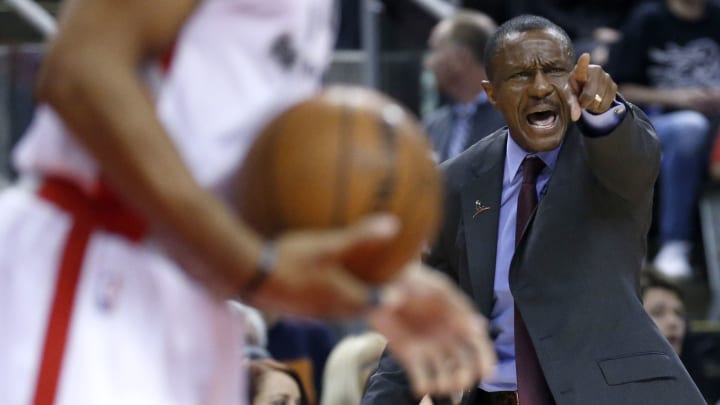Raptors Coach Dwane Casey Gets His Moment

There's something different about the Toronto Raptors. It goes beyond the overt changes to their offensive system and the improvements made to their roster. Toronto feels like a new team, in a sense, but its power comes in the balance between existing continuity and spirited reinvention. That kind of reframing takes hard, continuous work. It demands a "culture reset," in the words of team president Masai Ujiri, and the will to follow through on the uncomfortable.
There is always friction in change. But Raptors coach Dwane Casey saw it as necessary—even transformative. He stripped away the formula of a 50-win team so that they might win 60. And they might. It took a training camp, a preseason, and a few weeks more for this team to find its new rhythm. Once found, they never looked back. Toronto goes into the All-Star break with a seven-game win streak and the best record in the Eastern Conference—not to mention a chance at the best season in franchise history.
The Crossover’s Guide to NBA All-Star Weekend 2018
None of this would be possible without Casey, whose seven years of equity in Toronto allowed for the Raptors to change shape. The NBA has seen its share of smart, well-intentioned coaches promise their team a more modern style. But there is always some star to cater to, some veteran to indulge. What made Toronto's conceptual exercise into reality was the trust that Casey and his staff had built. An NBA coach only has so much political capital. Casey spent his convincing two star guards to shift the way they play, and an entire roster to reimagine how it might best support them.
Toronto didn't merely rearrange the priorities of its offense—it changed the underlying geometry. Every drive-and-kick took a slightly different angle. Shooters assumed new positions, and dragged their help defenders with them. Kyle Lowry and DeMar DeRozan were deployed in subtler ways, often for the sake of initiating an action rather than completing one. The reads that long-time Raptors could make in their sleep were papered over. Any setbacks have been surprisingly minimal.
Meanwhile, Lowry averages 16.6 points and 6.5 assists and is at a five-year low in playing time with depressed production, but registers a considerable and sustained impact. DeRozan is playing the best basketball of his career and parsing the game more deftly than ever before. His 5.2 assists per game this season are even more impressive than his 27.3 points per game were last year. Their efforts—in the context of a more comprehensive overhaul—have solidified the Raptors as a genuinely elite team. Toronto is one of only two clubs in the league to sit in the top five in both offense and defense, and they keep closer statistical company with the Warriors and Rockets than they do the Celtics and Cavs.
Casey informs every bit of that. Credit is due to the players for the compromises they've made and their commitment to system. Barring some late-game regression into old habits, the Raptors have largely stuck to the script. Yet it was Casey who convinced them and, in moments of frustration, has rallied them. It's through his rotation that young, all-bench lineups became some of the Raptors' best. And it's because those reserves were put in positions to succeed that Lowry and DeRozan's minutes have remained manageable—and that the team, collectively, has the energy to dig in on defense. The burdens of success in Toronto are shared more equitably now than ever before.
To Avoid Another All-Star Calamity, the NBA Must Fix Its Voting Process
There's a touch of magic in that. The Raptors have taken to their new style with a sureness that, frankly, did not seem possible. Successful teams are not often receptive to hard truths. Toronto, to its credit, internalized them. It absorbed the lessons of playoff breakdowns and matchup failures, and through them found the means for a new stability.
This core has never been better. This franchise has never been better. For that, the Raptors can thank Casey, their third representative at this weekend's All-Star festivities. There isn't much purpose in "coaching" an exhibition game, though there surely is in honoring the means that got him there.

Rob Mahoney is an NBA writer dedicated to the minutiae of the game of basketball, its overarching themes and everything in between. He joined the Sports Illustrated staff in 2012.